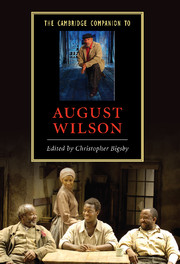Book contents
- Frontmatter
- 1 August Wilson: the ground on which he stood
- 2 Been here and gone
- 3 August Wilson’s relationship to black theatre: community, aesthetics, history and race
- 4 Music and mythology in August Wilson’s plays
- 5 Gem of the Ocean and the redemptive power of history
- 6 Joe Turner’s Come and Gone
- 7 Ma Rainey’s Black Bottom: cutting the historical record, dramatizing a blues CD
- 8 A piano and its history: family and transcending family
- 9 The tragedy of Seven Guitars
- 10 Safe at home?: August Wilson’s Fences
- 11 Two Trains Running: blood on the tracks
- 12 Jitney, folklore and responsibility
- 13 King Hedley II: in the midst of all this death
- 14 Radio Golf: the courage of his convictions - survival, success and spirituality
- 15 Critics on August Wilson
- 16 An interview with August Wilson
- Index
2 - Been here and gone
Published online by Cambridge University Press: 28 January 2008
- Frontmatter
- 1 August Wilson: the ground on which he stood
- 2 Been here and gone
- 3 August Wilson’s relationship to black theatre: community, aesthetics, history and race
- 4 Music and mythology in August Wilson’s plays
- 5 Gem of the Ocean and the redemptive power of history
- 6 Joe Turner’s Come and Gone
- 7 Ma Rainey’s Black Bottom: cutting the historical record, dramatizing a blues CD
- 8 A piano and its history: family and transcending family
- 9 The tragedy of Seven Guitars
- 10 Safe at home?: August Wilson’s Fences
- 11 Two Trains Running: blood on the tracks
- 12 Jitney, folklore and responsibility
- 13 King Hedley II: in the midst of all this death
- 14 Radio Golf: the courage of his convictions - survival, success and spirituality
- 15 Critics on August Wilson
- 16 An interview with August Wilson
- Index
Summary
If anybody asks you who sang this song
Tell 'em
It was little Jimmy Rushing,
He's been here and gone.
The playwright August Wilson lives in a leafy, genteel part of Seattle intended by the city's founding fathers to be the site of the state capitol, and so named Capitol Hill. He moved here in 1994, with Constanza Romero, a Colombian born costume designer who is now his third wife, and they share a rambling turn-of-the-century house with Azula, their three-year-old daughter. Azula has her father's ear and number, as well as total control of the living room, which, apart from a jukebox and a piano - props from Wilson's productions - hasn't a stick of adult furniture. Wilson, who doesn't drive, is more interested in the inner terrain than the external one; writing, he says, 'is for me like walking down the landscape of the self. . . . You find false trails, roads closed for repairs, impregnable fortresses, scouts, armies of memory, and impossible cartography.'
Wilson does most of his pathfinding below the living room, in a low-ceilinged basement, lit by neon bars, where he goes to sneak cigarettes, listen to records, and wait for his characters to arrive. He writes standing up, at a high, cluttered pine accounting desk, where he can prop his legal pad and transfer his jottings to a laptop computer. Pinned on a bulletin board, just beside where he stands to write, are two quotations, as bold as street signs: 'TAKE IT TO THE MOON' (Frank Gehry) and 'DON'T BE AFRAID. JUST PLAY THE MUSIC' (Charlie Parker). When Wilson looks up from his desk, at the dingy wall with its labyrinth of water pipes, he sees honorary degrees from the University of Pittsburgh, his home town, and from Yale, where his career as a playwright began in 1982 - just two of twenty-three he has accumulated so far, which is not bad for a fifty-five-year-old writer who quit school when he was fifteen.
- Type
- Chapter
- Information
- The Cambridge Companion to August Wilson , pp. 28 - 51Publisher: Cambridge University PressPrint publication year: 2007
- 1
- Cited by

